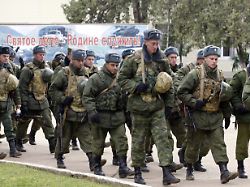EU warns of “small spark”
Russians withdraw technology and troops from Georgia
08/07/2023 10:08 am
For 15 years, Russia has controlled 20 percent of Georgian territory. However, according to EU observers, Moscow has withdrawn soldiers and technology from South Ossetia and Abkhazia. But the conflict could escalate at any time.
The EU observer mission in Georgia now sees significantly fewer Moscow soldiers in the Russian-controlled conflict regions of South Ossetia and Abkhazia than before the war against Ukraine. “They also moved out a lot of technology,” said the head of the mission, Dimitrios Karabalis, in Tbilisi. Russia is therefore dependent on resources from abroad due to its war against Ukraine. Nevertheless, even 15 years after the war between Russia and Georgia from August 8 to 12, 2008, the Greek diplomat sees no movement towards a possible solution to the conflict over the breakaway regions of Abkhazia and South Ossetia.
Among the more than 200 observers who are patrolling the Georgian side on behalf of the European Union, there are currently 23 Germans on duty, mostly police officers. They face Russian troops directly there and, on the Georgian-controlled side, monitor the situation along the 390-kilometer administrative border line with South Ossetia and 150 kilometers along the line with Abkhazia. Karabalis currently sees no acute danger that the conflict will erupt openly there. “They have neither the staff nor the technology to do anything,” he says, also referring to the Georgian side.
“A small spark can start a big fire”
Unlike neighboring Azerbaijan, which has armed itself with billions in revenue from oil and gas sales in order to take back the Nagorno-Karabakh region in a war against Armenia, there are no such resources in Georgia. “We’re trying to keep the situation calm here,” said Karabalis. Tensions could escalate into violence at any time. “A small spark can start a big fire,” he said. Karabalis also sees a problem in that Russia, which is at war with Ukraine, has withdrawn experienced forces from South Ossetia. Instead, there are now young, inexperienced soldiers and border guards who are not familiar with the situation on the ground. “They don’t know who we are, they’re not prepared. That’s a security risk,” emphasized Karabalis. “That’s why we’re distributing leaflets in Russian to explain what we’re doing.”
For many people in the conflict region, it is about existential questions, explained the chief observer. There are disputes about water resources or the routing of power lines. “Or a cow that a farmer from South Ossetia needs to survive is suddenly in Georgian-controlled territory. That’s where we come in. There’s a hotline through which problems can be reported and which can then be solved operationally,” he said. According to Karabalis, people from South Ossetia and Abkhazia come to other parts of Georgia for medical treatment. In South Ossetia, the checkpoints are open in the second third of the month, in Abkhazia traffic runs permanently over a bridge with permits.
“We are not here to solve the conflict,” stressed Karabalis. In his view, this would also require more commitment from the European side to exert pressure to get Georgia to move. Many politicians also do not understand that Georgia lost the war. “Negotiations require compromises.” Georgia lost control of 20 percent of its territory during the war. Russia was one of the few countries to recognize Abkhazia and South Ossetia as independent states. Also because the situation has not changed, 15 years after the war, Karabalis still sees the need to continue the mission that has been in place since October 1, 2008.
